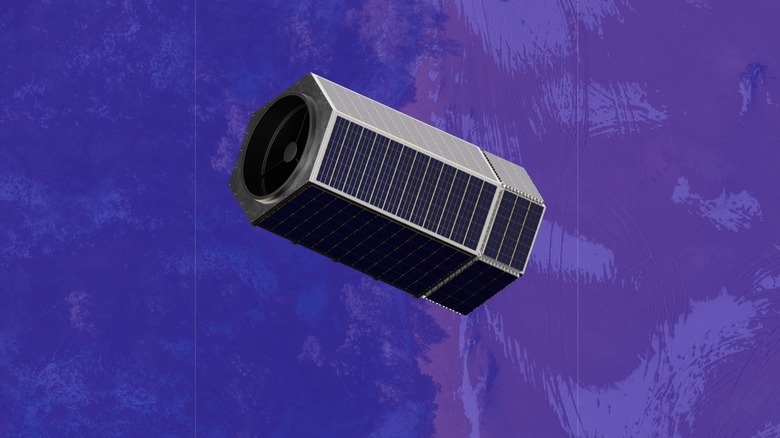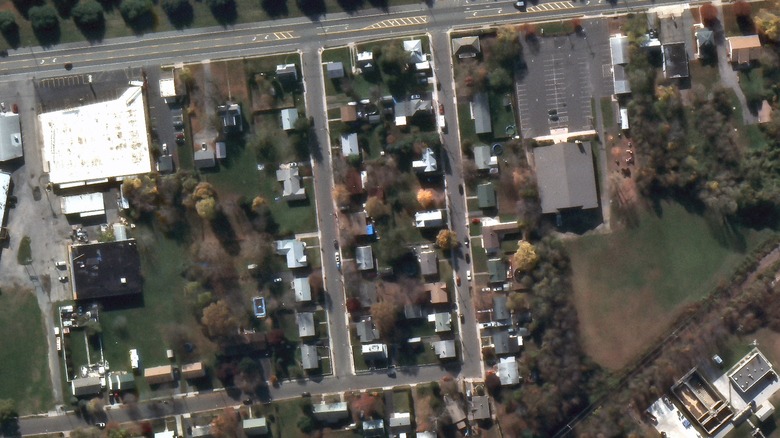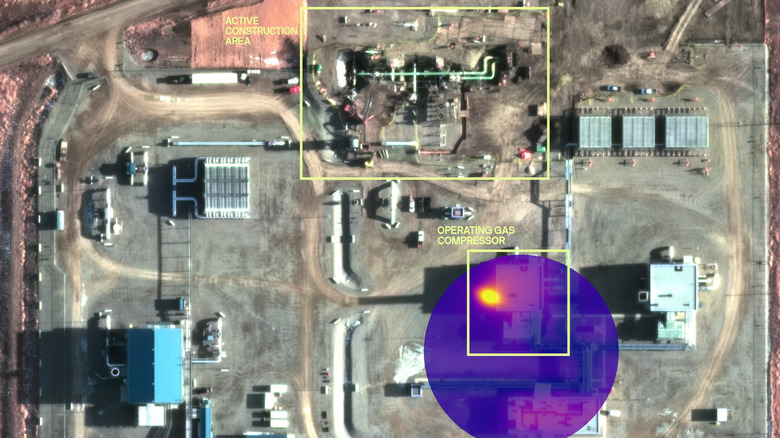A New Class Of Scary Satellites Is Ringing James Bond Villain Alarms
Reconnaissance from space is not a new phenomenon, even though the true extent of deployment has always been shrouded in mystery. The Corona satellite surveillance project in the '60s — which culminated just over half a decade ago and was publicized as the "Discoverer" program — was deployed for scientific experiments, leading to the death of multiple monkeys during tests. However, in the years that have followed, there has been an unprecedented rise in commercial interest with the space segment — led by the likes of SpaceX, which is now running errands for NASA, as well as government agencies.
However, as surveillance tech has advanced in terms of imaging capabilities, as well as the pace at which projects can be put into the planet's orbit, the surveillance aspect has managed to avoid much debate from a privacy perspective. One particular name that has raised eyebrows for the wrong reasons — and with support from government agencies in tow — is Albedo Space.
The company, which emerged from the halls of startup haven Y-Combinator in 2021 with fat seed funding to mark its arrival in the public realm, aims to launch satellites that offer an unprecedented image resolution of 10 centimeters. That's a growth worth three times in terms of details that a satellite can uncover.
With its visual ability to go as deep as detecting objects measuring 10 centimeters, it's possible for the Albedo satellite to not only make out a person, but also discern whether you are naked or clothed. Albedo notes that it is "the first company to offer aerial-quality imagery from space."
What can these next-gen satellites do?
"The results are stunning," writes Albedo co-founder and CTO Winston Tri. He adds that the images captured by Albedo's satellite can specify details like the make of a vehicle, check if its rear bed is loaded with items, check out details and signs of damage on a roof, installations like trampolines in your backyard, power lines, road marking, and more. The company's website, discussing deployment areas, mentions "infrastructure, natural resources, logistics, or ecosystems."
Experts, however, are concerned about risky future prospects. "The advent of these low-earth satellites exposes the new era of surveillance potential that raises profound privacy concerns," Star Kashman, a cybersecurity and legal expert whose work has won recognition by the Office of the Director of National Intelligence, tells SlashGear.
Albedo's website shows what looks like an airport launching pad, alongside a description that says "Albedo lets you monitor hotspots, eliminate uncertainty, and mobilize with speed." Notably, Albedo's satellite platform is also capable of thermal imaging at a perceived resolution of two meters. The company also lists insurance, energy, and emergency disaster response as some of the areas where its tech can prove to be revolutionary.
Moreover, the relaxation of regulatory guidelines over satellite-based reconnaissance is going to help Albedo and its clients, which include government agencies that have already invested in Albedo's business. "With regulations and technical limitations put to bed, our imagery will be available and accessible to all commercial and government users for next-gen problem-solving," Tri notes.
Catching the eye of government agencies
Albedo says it can do synthetic thermal imaging based on traits like paint color on an object, helping extract details such as whether a machine is running or not, finding heat or energy leaks, understanding soil conditions, and flow of liquid from industrial complexes such as power plants. All of that sounds impressive from a commercial or industrial standpoint, but Albedo clearly mentions "defense & intelligence" as prospective business clients.
Now, Albedo's case is rather peculiar; and not in a good way, if history is any indication. Barely two years into its foundation, the company scored a Direct to Phase II Small Business Innovation Research (SBIR) contract — the second straight investment from the Department of the Air Force's innovation arm, and taking its net investment to $2.5 million. In December 2023, the National Reconnaissance Office (NRO) awarded a contract to Albedo for providing electro-optical satellite imagery.
The NRO was originally conceived to conduct satellite recon missions for the CIA and Air Force in 1961, but was initially labeled as a top-secret program. As of 1985, this secretive group commanded the largest budget of any intelligence agency at $5 billion, according to The Washington Post. It was only in 1992 that its existence was declassified. With vested involvement from multiple government agencies right from its early days, Albedo's satellites have already raised multiple privacy alarms.
The SpaceX-Musk connection
The company will launch its satellite in very low Earth orbit (VLEO) next year, and aims to have an operational 24-satellite constellation ready in 2027, allowing these satellites to cover any given spot on Earth at least five times each day. "This is a giant camera in the sky for any government to use at any time without our knowledge," the Electronic Frontier Foundation's Jennifer Lynch was quoted as saying by The New York Times.
"It is enough of a violation for drones to capture our houses on Google Maps," Kashman tells SlashGear. "Increasing the stakes and having low-earth satellites capable of identifying human faces roaming around, is immensely concerning and can lead to countless privacy concerns, cybersecurity concerns, and violations of rights." It seems Albedo isn't the only player willing to lease its satellite tech to government agencies.
A bombshell Reuters report claims that Elon Musk's SpaceX is "building a network of hundreds of spy satellites under a classified contract" with the NRO. Notably, the contract is worth $1.8 billion — way more than what Albedo has received in the form of grants. Moreover, the report mentions that over a dozen prototypes have already been launched. "No one can hide," one of the sources was quoted as saying. In the absence of legal frameworks and privacy safeguards, Kashman tells SlashGear, these satellites are going to infringe on a citizen's reasonable expectations of privacy.



